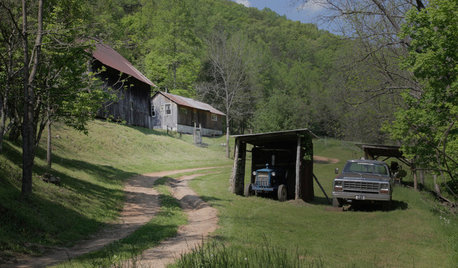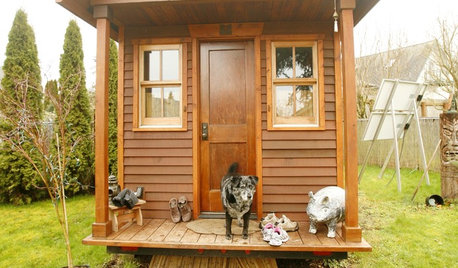Shelf life of compost?
raymondo17
11 years ago
Related Stories

LIFE10 Smart Organizing Ideas That Make Life Easier
Rethink where and how you store household basics, from bills to baking supplies, to buy some time and save some headaches
Full Story
LIFE11 Tiny Tricks That Make Life a Tad Better
Make these small tweaks to your home and daily routine, and life will be easier, less rushed and maybe healthier too
Full Story
MY HOUZZMy Houzz: Pursuing Their Life’s Work in Rural Oregon
This creative couple craft a live-work world all their own in the high country of eastern Oregon
Full Story
TASTEMAKERSNew Series to Give a Glimpse of Life ‘Unplugged’
See what happens when city dwellers relocate to off-the-grid homes in a new show premiering July 29. Tell us: Could you pack up urban life?
Full Story
DECORATING GUIDESDecorate With Intention: Simplicity for Life's Sake
10 (easy and cheap) ways to create space and time for the life you want
Full Story
MOST POPULARThree Magic Words for a Clean Home and a Better Life
Not a natural tidying and organizing whiz? Take hope in one short phrase that can change your life forever
Full Story
SMALL SPACESLife Lessons From 10 Years of Living in 84 Square Feet
Dee Williams was looking for a richer life. She found it by moving into a very tiny house
Full Story
BOOKSCan Tidying Up Result in Life-Changing Magic?
Organizing phenom Marie Kondo promises big results — if you embrace enormous changes and tough choices
Full Story
KITCHEN DESIGNPersonal Style: 50 Clever Real-Life Kitchen Design Details
Get ideas from savvy homeowners who have a knack for creating kitchens celebrating personal style
Full Story
ORGANIZINGPersonal Spaces: 12 Real-Life Savvy Shoe Storage Ideas
Check out how these homeowners keep their footwear organized — tucked away or out on display
Full Story





nc_crn
toxcrusadr
Related Professionals
Norton Shores Landscape Architects & Landscape Designers · Suffern Landscape Architects & Landscape Designers · Barrington Landscape Contractors · Bloomington Landscape Contractors · Concord Landscape Contractors · Huntley Landscape Contractors · North Lauderdale Landscape Contractors · Pleasanton Landscape Contractors · Wallingford Landscape Contractors · York Landscape Contractors · Bethany Decks, Patios & Outdoor Enclosures · Billerica Decks, Patios & Outdoor Enclosures · Fairfax Decks, Patios & Outdoor Enclosures · Overland Park Decks, Patios & Outdoor Enclosures · Somerville Decks, Patios & Outdoor EnclosuresKarchita
toxcrusadr
raymondo17Original Author
Kimmsr
Raw_Nature
nc_crn
Lloyd
nc_crn
Lloyd
Laurel Zito
jonfrum
jolj
Kimmsr